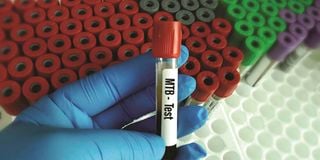Premium
Pandemic, funding shortfalls hamper HIV-TB response

What you need to know:
- Global funding for TB research totalled US$915 million in 2020; less than half the goal of US$2 billion set forth by participating country governments at the 2018 United Nations High-Level Meeting on TB.
- While public sector agencies made up 10 of the 15 top individual entities for TB funding, the number of countries meeting their fair share targets to allocate 0.1 per cent of their government’s overall R&D funding to TB has declined since 2017.
When Covid-19 hit the country in 2020, like many people living with HIV, the future seemed bleak for Marie*.
Even before the pandemic had struck, the 23-year-old from Mathare slums in Nairobi was dealing with the harsh reality of living without any kind of income.
And as the government imposed lockdowns and movement restrictions after the Covid-19 outbreak, it reached a point where she was forced to do laundry work in her neighbourhood so she could get money to buy food, and thus take her antiretroviral drugs (ARVs).
“It reached a point where even the small amount of money that I was getting from doing laundry work was not forthcoming, which meant that with lack of food, there were times I defaulted on my ARV’s.”
This increased her risk of opportunistic infections, and she eventually contracted tuberculosis (TB). “I was diagnosed with TB and placed under medication.”
The movement restrictions that were brought about by the pandemic again inhibited her from accessing TB drugs.
“Movement was limited so going to pick the drugs was a challenge. I was jobless at the time and I couldn’t afford to go to hospital for my TB drugs. Also, many people facing the same predicament as Marie, tried as much as possible to stay away from health facilities, fearing they would contract Covid-19 from health workers.
“I skipped my drugs and in the process contracted opportunistic illnesses that I had to be taken to hospital.”
Fortunately, she was able to complete her TB medication and even recover, and she is now still taking her ARVs.
However, that hasn’t been the case for many people who apart from living with HIV contracted TB during the pandemic period.
Last month, the Stop TB Partnership, a United Nations hosted entity based in Geneva, Switzerland committed to revolutionising TB space to end the disease by 2030, noted that TB deaths among people living with HIV increased for the first time since 2010, with 214, 000 deaths recorded in 2020.
According to the latest WHO Global TB Report, in 2020, TB deaths increased for the first time in over a decade, going up to as high as 1.5 million. In 2020, TB deaths among people living with HIV represented around 14 per cent of all deaths from TB.
These figures were due to the Covid-19 pandemic, which lead to reduced access to TB diagnosis and treatment services.
Last year, Dr George Oballa, the technical advisor of the Health ministry’s programmatic management of DRTB, National TB programme, predicted that low TB detection rates, TB staff reassignment, bad health seeking behaviours for fear and phobias of contracting Covid-19 from hospitals, and conversion of TB isolation treatment centres to Covid-19 wards, could impact negatively on the quality of TB care.
Globally, about half of people living with HIV are being diagnosed with and treated for TB. This proportion is highest in the African region and exceeds 50 per cent in parts of Southern Africa.
With TB services dramatically underfunded, experts warn we can expect to see further increased mortality due to TB among people living with HIV in years to come.
Global funding
A report released on December 9, 2021 by Treatment Action Group and the Stop TB Partnership, found that global funding for TB research totalled US$915 million in 2020; less than half the goal of US$2 billion set forth by participating country governments at the 2018 United Nations High-Level Meeting on TB.
While public sector agencies made up 10 of the 15 top individual entities for TB funding, the number of countries meeting their fair share targets to allocate 0.1 per cent of their government’s overall R&D funding to TB has declined since 2017. Only the United Kingdom reached that target in 2020, compared to three countries in 2019. Meanwhile, the number of governments meeting over half of that, at 0.05 per cent, has also fallen.
According to Dr Lucica Ditiu, executive director of the Stop TB Partnership, TB funding remains pathetically low compared to other disease areas, and insufficient even for diagnosis and treatment.
According to the report, TB vaccine research has been slowed down by chronic underfunding – still US$2.7 billion behind the UN goal for 2018-2022.
There is only one moderately effective century-old TB vaccine compared to over 20 far more effective ones for Covid-19.
“What has enabled the development of dozens of Covid-19 vaccines in less than a year has essentially been money. I think that the same enormous amount of funding should be applied with equal vigour to the development of TB vaccines,” says Austin Aurinze Obiefuna, executive director of the Afro Global Health Alliance and incoming vice-chair of the Stop TB Partnership Board.
Dr Ditiu says further investments, modern TB diagnostics, regular screening (such as X-ray and rapid molecular tests) are needed to alter this trend, thus ensuring access to a full package of TB services for everyone, everywhere, without discrimination. “But due to a dramatic lack of resources, — especially in the African region — lack of political commitment, millions of people are left behind, and millions of lives are lost,” adds Dr Ditiu.





